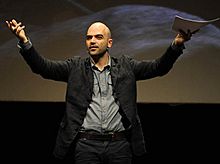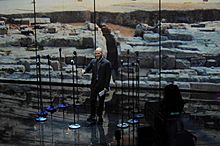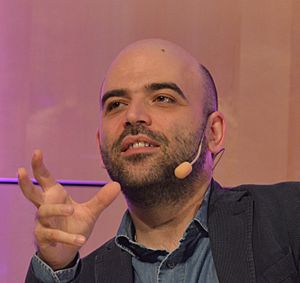Roberto Saviano facts for kids
Quick facts for kids
Roberto Saviano
|
|
|---|---|
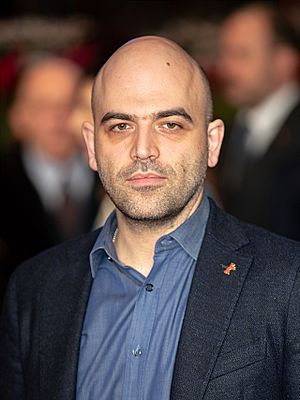
Saviano in 2019
|
|
| Born | 22 September 1979 Naples, Italy |
| Occupation |
|
| Nationality | Italian |
| Period | 2000–present |
| Notable works |
|
Roberto Saviano (Italian: [roˈbɛrto saˈvjaːno]; born 22 September 1979) is an Italian writer, essayist, journalist, and screenwriter. In his writings, including articles and his book Gomorrah, he uses literature and investigative reporting to tell of the economic reality of the territory and business of organized crime in Italy, in particular the Camorra crime syndicate, and of organized crime more generally.
After receiving death threats in 2006 made by the Casalesi clan of the Camorra, a clan which he had denounced in his exposé and in the piazza of Casal di Principe during a demonstration in defense of legality, Saviano was put under a strict security protocol. Since 13 October 2006, he has lived under police protection.
Saviano has collaborated with numerous important Italian and international newspapers. Currently, he writes for the Italian publications l'Espresso, la Repubblica, and The Post Internazionale. Internationally, he collaborates in the United States with The Washington Post, The New York Times, and Time; in Spain with El Pais; in Germany with Die Zeit and Der Spiegel; in Sweden with Expressen; and in the United Kingdom with The Times and The Guardian.
His writing has drawn praise from many important writers and other cultural figures, such as Umberto Eco.
Saviano identifies as an atheist.
Contents
Biography
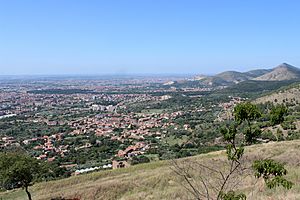
Son of Luigi Saviano, a Neapolitan doctor, and Miriam Haftar, a Ligurian of Jewish origins, Roberto Saviano received his high school diploma from the Armando Diaz State Scientific High School and then graduated in philosophy from the University of Naples Federico II, where he was the student of historian Francesco Barbagallo. In 1997, while in high school, he grew close to the Italian Marxist–Leninist Party (PMLI) and published articles on its weekly newspaper, Il Bolscevico, under the pseudonym Roberto Ercolino. However, in 2001, he broke all links with the PMLI.
He began his career in journalism in 2002, writing for numerous magazines and daily papers, including Pulp, Diario, Sud, Il manifesto, the website Nazione Indiana, and for the Camorra monitoring unit of the Corriere del Mezzogiorno. His articles at the time were already important enough to spur judicial authorities at the beginning of 2005 to listen to him regarding organized crime.
In March 2006, he published Gomorrah, a novel inspired by real events. He is the author, along with Mario Gelardi, of a theatrical work of the same name and is a screenwriter for Gomorrah, the movie based on the novel. On 10 December 2009, in the presence of Nobel Prize winner Dario Fo, Saviano received the title of Honorary Member of the Academy of Fine Arts of Brera and the Second Level Academic Diploma Honoris Causa in Communication and Art Education, which is the highest degree given by the university. On 22 January 2011, the University of Genoa awarded him a bachelor's degree honoris causa in law "for the important contribution to the fight against crime and to the defense of legality in our country". Saviano dedicated the honor to the judges of Milan's district attorney's office who were investigating Rubygate. This led to a controversy with Marina Berlusconi, daughter of Silvio Berlusconi and president of the publishing house Arnoldo Mondadori Editore.
Saviano is primarily influenced by southern Italian intellectuals such as Giustino Fortunato and Gaetano Salvemini, by the anarchists Errico Malatesta and Mikhail Bakunin, and by poet Rocco Scotellaro. Additionally, he has said that his educational background includes many prominent writers such as Ernst Jünger, Ezra Pound, Louis Ferdinand Celine, Carl Schmitt, and Julius Evola.
In 2015, Saviano collaborated with the Neapolitan playwright Mimmo Borrelli on the play Sanghenapule – Vita straordinaria di San Gennaro, which was part of the 2015/2016 season of the Piccolo Teatro of Milan.
In 2006, following the success of Gomorrah, which denounces the activities of the Camorra, Saviano received ominous threats. These were confirmed by police informants and reports that revealed attempts on Saviano's life by the Casalesi clan. Investigators have claimed that the Camorra selected Casalesi clan boss Giuseppe Setola to kill Saviano.
After the Neapolitan police investigations, the Italian Minister for Interior Affairs Giuliano Amato assigned Saviano a personal bodyguard and transferred him from Naples. In the fall of 2008, informant Carmine Schiavone, cousin of the imprisoned Casalesi clan boss Francesco Schiavone, revealed to the authorities that the clan had planned to eliminate Saviano and his police escort by Christmas on the motorway between Rome and Naples with a bomb; in the same period, Saviano announced his intention to leave Italy in order to stop having to live as a convict and reclaim his life.
On 20 October 2008, six Nobel Prize-awarded authors and intellectuals (Orhan Pamuk, Dario Fo, Rita Levi-Montalcini, Desmond Tutu, Günter Grass, and Mikhail Gorbachev) published an article saying that they sided with Saviano against the Camorra. They also stated that the Italian government must protect Saviano's life and help him lead a normal life. Signatures were collected on the website of the Italian newspaper La Repubblica.
Saviano contributed an op-ed piece to the 24 January 2010 issue of the New York Times, entitled "Italy's African Heroes". He wrote about the January 2010 riots between African immigrants and Italians in Rosarno, a town in Calabria. Saviano suggests that the rioting was more of a response to the migrants' exploitation by the 'Ndrangheta, or Calabrian mafia, than to the hostility of Italians.
In November 2010, he hosted, along with Fabio Fazio, the Italian television program Vieni via con me, which was broadcast over four weeks by Rai 3.
Saviano's book, ZeroZeroZero was published by Feltrinelli in 2013, and the English translation was published by Penguin Random House in July 2015. .....
In October 2023, Saviano was given a suspended €1,000 fine for his use of profanity against Giorgia Meloni in December 2020. Saviano used the word during a televised interview while describing Meloni's and Matteo Salvini's anti-immigration stance. Per the ruling, Saviano will only have to pay the fine if he repeats the offense. According to Saviano's lawyer, he will appeal the verdict.
Gomorrah, ZeroZeroZero
In March 2006, Saviano's first book, Gomorrah: A Personal Journey into the Violent International Empire of Naples' Organized Crime System, was published as part of Mondadori's Strade Blu series. It describes the business and criminal world of the Camorra and of the places where the organization was born and exists: the region of Campania, the city of Naples, the towns of Casal di Principe, San Cipriano d'Aversa, and the territory around Aversa known as the agro aversano. Having grown up there, the author introduces the reader to a reality unknown to outsiders. The book talks about the criminal bosses' sumptuous villas copied from Hollywood films, rural lands filled with the toxic waste of half of Europe, and a population that not only cohabitates with organised crime but even protects it and approves of its actions.
As of August 2009, the book had sold 2.5 million copies in Italy alone and was translated into 52 languages. In the rest of the world, about 2 million copies of Gomorrah were sold. It was present on bestseller lists in Germany, the Netherlands, Belgium, France, Sweden, Finland, Lithuania, Albania, Israel, Lebanon, and Austria.
A stage show was based on Gomorrah, earning Saviano the best actor of a new Italian play award at the Olimpici del Teatro/Theater Olympics in 2008. A film of the same name, directed by Matteo Garrone, was also created; it won the prestigious Grand Prix at the Cannes Film Festival in 2008. In 2009, the film won the Tonino Guerra Prize for best script at the Bari International Film Festival.
A television show titled Gomorrah - La serie was produced by Sky Italia, Fandango, Cattleya, Beta Film, and LA7, under the supervision of Saviano and the direction of Stefano Sollima, Francesca Comencini, and Claudio Cupellini. It ran for five series, commencing in 2014 and concluding in 2021.
.....
Threats and life under police protection
The success of his book created numerous problems for Saviano, starting with threatening letters, silent phone calls, and protective isolation.
During a demonstration for legality in Casal di Principe on 23 September 2006, the writer denounced the business of the leaders of the Casalese clan, Francesco Bidognetti and Francesco Schiavone (currently in prison), and the two ruling bosses at the time, Antonio Iovine and Michele Zagaria. He addressed them in robust tones ("You are not from this land! Quit being part of this land!") and invited residents to rebel. Because of the threats and intimidation Saviano received consequently, the then-Minister of the Interior, Giuliano Amato, decided to assign him police protection beginning on 13 October 2006.
On 14 March 2008, during the Spartacus Trial, the attorney for Casalese bosses Francesco Bidognetti and Antonio Iovine, Michele Santonastaso (assisted by Carmine D'Aniello), read a letter written jointly by Bidognetti and Iovine (while both were in prison) to the president of the First Section of the Appellate Court of Assizes, Raimondo Romeres. The letter contained a request to move the trial due to legittima suspicione, or doubt surrounding the impartiality of the judicial body, caused by the alleged influence of Roberto Saviano, Rosaria Capacchione, and the district attorneys Federico Cafiero de Raho and Raffaele Cantone, on the judges. Following this, Minister of the Interior Amato decided to strengthen security measures for the writer, increasing his police escort from three to five men. Bidognetti and Iovine, and their attorneys Michele Santonastaso and Carmine D'Aniello, were then charged with intimidation of Saviano and Capacchione. Before the third criminal section of the Court of Naples, the Assistant Prosecutor of the District Anti-Mafia Directorate (DDA), Antonello Ardituro, requested the maximum sentence on conviction of one year and six months imprisonment. The sentence was passed for Bidognetti, Santonastaso, and D'Aniello, while Iovine was acquitted due to insufficient proof. The attorney general for Reggio Calabria, Federico Cafiero de Raho, testified during the trial, stating that Saviano was a "mortal enemy of the clan" and recalling that Saviano was among the few journalists present at all 52 of the prosecutor's closing speeches for the Spartacus Trial.
On 14 October 2008, reports emerged of a possible assassination plot against Saviano. A police inspector of the Milan Anti-Mafia Investigation Department DIA) informed the DDA that the pentito, Carmine Schiavone (cousin of boss Francesco Schiavone, aka Sandokan), had informed him of a plan, already in operation, to kill the writer and his bodyguards before Christmas through a spectacular attack on the highway between Rome and Naples, in the style of the assassination of anti-Mafia judge Giovanni Falcone at Capaci. However, when interrogated by magistrates, Schiavone denied any knowledge of the plan, provoking the writer's immediate response: "It's obvious that he'd say this; if he were to talk [about the plan], it would mean implicitly admitting to still having connections with organized crime". Subsequently, the district attorney heading the investigation requested and obtained dismissal of the case as the reports appeared to be unfounded, although Schiavone confirmed that Saviano had been condemned to death by the Casalese clan.
In October 2008, Saviano decided to leave Italy for a time, as the result of threats, which were confirmed by reports and statements from informants, revealing a Casalesi clan plan to eliminate him.
Appeal from Nobel Prize winners
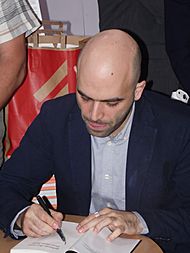
On 20 October 2008, six international Nobel Prize winners rallied in support of Roberto Saviano, asking the Italian government to do something to protect him and to defeat the Camorra, and emphasizing the fact that organized crime is not merely a problem for police that only concerns the writer, but is a problem for democracy that concerns all free citizens. The appeal concluded that citizens cannot tolerate the fact that the events described in Saviano's book are taking place in 2008 in Europe, just as they can't tolerate that the price one pays for denouncing these events means losing one's freedom and safety. The Nobel Prize winners who launched the appeal were: Dario Fo, Mikhail Gorbachev, Günter Grass, Rita Levi-Montalcini, Orhan Pamuk, and Desmond Tutu.
The appeal was signed by writers including Jonathan Franzen, Javier Marías, Jonathan Safran Foer, Jonathan Lethem, Martin Amis, Chuck Palahniuk, Nathan Englander, Ian McEwan, Hans Magnus Enzensberger, José Saramago, Elfriede Jelinek, Wislawa Szymborska, Betty Williams, Lech Wałęsa, Paul Auster, Siri Hustvedt, Peter Schneider, Colum McCann, Patrick McGrath, Cathleen Shine, Junot Diaz, Tahar Ben Jelloun, Taslima Nasreen, Caro Llewelyn, Ingrid Betancourt, Adam Michnik, and Claudio Magris. Foreign media—from El País to Le Nouvel Observateur and from Courrier International to Al Arabiya and CNN—also spread the initiative.
Following this, various radio stations opened up to debates and comments on the subject. The program Fahrenheit on Italy's Rai Radio 3 organized a marathon reading of Gomorrah in which celebrities from the world of culture, news, theater, and civil society participated. Numerous Italian cities also offered honorary citizenship to the writer, while many schools subscribed to the appeal. The Casa della Memoria e della Storia ("House of Memory and History") in Rome hosted an eight-hour choral reading of Gomorrah.
In addition to the signatures of the six prominent figures, normal citizens were able to sign the appeal on a special page created by the newspaper La Repubblica. More than 250,000 signatures were collected.
Plagiarism dispute
In 2013, Saviano and the Arnoldo Mondadori Editore publishing house were sentenced for plagiarism on appeal. The Appeals Court of Naples recognized that some pages of Gomorrah (0.6% of the entire book) were the results of an illicit reproduction of some lines from two articles from local daily papers, Cronache di Napoli and Corriere di Caserta. Therefore, it partially modified the sentence from the first-degree court in which the court had rejected the accusations made by the two newspapers and had, instead, condemned them to pay damages for having "abusively reproduced" two of Saviano's articles (this sentence was confirmed in the appeal). In the appeal, the writer and Mondadori were ordered to jointly pay reparations for property and other damages of 60,000 Euros, plus a portion of legal costs. The writer appealed the ruling at the Court of Cassation, and the Supreme Court partially confirmed the sentence of the Appeals Court, but called for a reconsideration of the damages, evaluating 60,000 Euros to be an excessive sum for newspaper articles with a very limited readership. The Supreme Court did not agree with Saviano's appeal, rejecting almost all of the findings and largely confirming the basic structure of the Appeals Court's sentence.[1]
In September 2015, journalist Michael C. Moynihan wrote an article for The Daily Beast, criticizing ZeroZeroZero and accusing Saviano of having used sections of text, including from Wikipedia, without citing his sources. In an article for the Italian newspaper La Repubblica, Saviano demonstrated how the passages from ZeroZeroZero and the presumed sources identified by Moynihan were manipulated in order to appear similar. The English newspaper The Guardian reported on the controversy with an article entitled "Roberto Saviano dismisses plagiarism claims over latest book", in which Saviano says, "I'm not a journalist (or a reporter), but, rather, a writer, and I recount real facts." Saviano adds that "Interpretations and theories have a provenance, not mere facts: those belong to all, to those who recount them and to those who read them, making them their own".
Among the various public personalities who have expressed their support of Roberto Saviano, the then-editor in chief of La Repubblica, Ezio Mauro, appeared in a video on the paper's website on 28 September 2015, to give his contribution to the "Saviano case." He repeated that "the facts of the news are available to all" and spoke about the "typical iconoclasm toward famous people who have constructed success and visibility based on their own hard work and studies." He continued by saying, "Saviano is paying for having an enormous following and, above all, for the fact that he hasn't remained comfortably in cultural obscurity".
Television
On 8–29 November 2010, Roberto Saviano hosted the cultural program Vieni via con me ("Come Away with Me") with Fabio Fazio on Rai 3. The program had very successful ratings: the third episode was seen by 9,671,000 viewers, or 31.6% of the television audience that evening. The show covered themes such as organized crime, immigration, women's emancipation, politics, and serious problems in Italian society. The program typically features the reading of "lists", with the goal of highlighting the issues addressed through a series of data. Numerous special guests appeared in the four episodes of the program.
Beginning on 14 May 2012, Saviano hosted the program Quello che (non) ho ("What I (don't) have"), once again with Fabio Fazio. It aired on La7 and was also streamed live on YouTube. The first episode was a record for La7, with 12.65%, or 3,036,000, viewers, and was the third most-watched program of the evening. This record was surpassed two days later with the third and final episode of the program, which registered 13.06% of viewers.
For four weeks from 4 October 2017, Saviano hosted the show Kings of Crime on the TV channel Nove, where he spoke of the major Italian and international bosses of the organized crime system.
Awards and honors
- 2010 European Book Prize
- 2011 PEN/Pinter Prize
- 2011 Olof Palme Prize, together with Lydia Cacho.
- Bachelor's degree honoris causa in law - University of Genoa, 22 January 2011
- On 18 January 2012, Roberto Saviano was named honorary citizen of Milan.
- Asteroid 278447 Saviano, discovered by Italian amateur astronomer Silvano Casulli in 2007, was named in honor of Saviano's merits as writer and journalist. The official naming citation was published by the Minor Planet Center on 6 April 2012 (M.P.C. 79108).
- On 7 June 2013, he officially received honorary citizenship of Florence from then-mayor Matteo Renzi.
- 2019 Oxfam Novib/PEN Award for Freedom of Expression
Music
- British trip hop group Massive Attack wrote a song inspired by the story of Roberto Saviano and Gomorrah. Titled "Herculaneum", it was featured in the soundtrack for the film Gomorrah.
- Neapolitan rapper Lucariello wrote a song called "Cappotto di legno" (Wooden Coat) with music by Ezio Bosso. Before writing the song, Lucariello received Saviano's approval for it because it tells the story of a killer who is preparing to kill Saviano.
- The group Subsonica, from Turin, dedicated their song "Piombo" from the album L'eclissi to the writer.
- The end of the track "In Italia" by rapper Fabri Fibra contains part of Enzo Biagi's interview of Roberto Saviano, in which the writer states, "One of my dreams was to remain in my own land, to recount it and to continue—how can I say it—to resist."
- The same rapper refers to Saviano in another one of his pieces. In the track "Teoria e Pratica" from the EP Casus Belli, he says, "Who would you like as president? Me, Saviano!"
- The song "TammorrAntiCamorra", from the album Suburb by the rap group 'A 67, contains the line "smettiamo di essere Gomorra" ("Let's Quit Being Gomorrah"), and is dedicated to the priest don Giuseppe Diana, who was killed by the Camorra. In the song, Roberto Saviano reads a fragment of his book.
- During the U2 concert in Rome on 8 October 2010, Bono mentioned Roberto Saviano two times and dedicated the group's famous song "Sunday Bloody Sunday" to the writer. Saviano was at the concert and had met with the U2 frontman before the show.
- Fabri Fibra cites Saviano and his book Gomorrah once again in the track "Guerra e pace" ("War and Peace") on his eponymous 2013 album.
- Clementino also cites Saviano in the song "Mea Culpa", on the album of the same name.
- Saviano is cited by the Sardinian rapper Salmo in the track "Nella pancia dello squalo" ("In the Stomach of the Shark") on the album The Island Chainsaw Massacre.
- The journalist is cited in the track "Perdona e dimentica" ("Forgive and Forget") by I Cani. Saviano showed his appreciation for the one-man band, writing that his songs "are among the best stories of our country. Electronic anthropology."
The writer dedicated a section of his official site to music in the Galleries section.
Filmography
Director
- I'm Still Alive (TBA)
Creator
- Gomorrah (since 2014, directed by Stefano Sollima, Francesca Comencini, Claudio Cupellini, Claudio Giovannesi, Marco D'Amore)
Screenwriter
- Gomorrah (2008, directed by Matteo Garrone)
- Gomorrah (since 2014, directed by Stefano Sollima, Francesca Comencini, Claudio Cupellini, Claudio Giovannesi, Marco D'Amore)
- Piranhas (2019, directed by Claudio Giovannesi)
- I'm Still Alive (TBA)
Adaptations
- Tatanka (2011, directed by Giuseppe Gagliardi)
- ZeroZeroZero (since 2019, directed by Stefano Sollima, Janus Metz, Pablo Trapero)
Video games
- Gomorrah (Microsoft Windows, Android, iOS, 2023)
See also
 In Spanish: Roberto Saviano para niños
In Spanish: Roberto Saviano para niños


